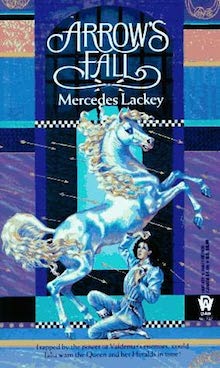In Arrows of the Queen, Talia Holderkin ran away from home and was Chosen by the Companion Rolan to be Queen’s Own. She survived an assassination attempt, helped unravel two plots against Valdemar, and found a new family among the Heralds. In Arrow’s Flight, Talia rode into the haunted Forest of Sorrows with Kris, on an internship that turned into a fight for survival against the forces of deepest winter and her own uncontrolled powers.
Arrow’s Fall opens with Kris deep in thought as he and Talia ride towards Haven. They’re filthy. They’ve been riding for a long time. They could have eaten, slept, and even made love while riding!
OH MY GOD DID TALIA AND KRIS MAKE LOVE?
It’s always my intention to be a kind and loving blogger. Sometimes I love these books with a present passion, and sometimes I love them with a sort of fondly critical nostalgia. I did not realize, when I started this re-read, that it would require me to spend three weeks finding creative ways to talk about the wide variety and nature of sexual connections between all of these people and their equine Companions. Consequently, these last weeks have been heavy on the critical nostalgia. I just want to write about the roads, the hot water heaters, and the Valdemaran people’s apparent affinity for the philosophies of Jean Jacques Rousseau, and not about their love lives.
This section of the series—chapters one and two of Arrow’s Fall—represents a theoretically important romantic moment. Dirk and Talia are finally in the same place, and have the opportunity to work together on the burning question facing them; Are they lifebonded? As readers, we don’t have to deal with any suspense about this because Kris’s Companion Tantris told Kris that Talia’s Companion Rolan knows for sure that Talia and Dirk are absolutely lifebonded. But Rolan didn’t ask Tantris to tell Kris to pass Dirk and Talia a note about it, so there will be several more chapters of angst. Now you know. Let’s talk about Valdemar’s government!
Valdemar doesn’t appear to have a formal constitution. Instead, the Prologue reminds us, the Monarch makes laws with the advice of the Council. Heralds dispense and enforce the law. I note that the Council only advises the monarch. Nothing in the prologue suggests that the council has to consent to laws. As being a Herald is a crucial prerequisite to being Valdemar’s Monarch, this means that one Herald makes the laws, and other Heralds interpret and enforce them. This is exactly the kind of situation Montesquieu warned would lead to tyranny when he wrote The Spirit of Laws. However, while Valdemar’s Heralds hold all the power, their ethical approach to governance and commitment to the common good limit their power without constitutional checks and balances.
At least, that’s the party line. But Valdemar isn’t a democratic society either, and the structures that concentrate power into a very small number of hands are well demonstrated in chapter two of Arrow’s Fall. The Council is considering a marriage proposal for Princess Elspeth, from Prince Ancar of Hardorn. Queen Selenay opposes the proposal—she hopes that Elspeth can marry for love, after she has completed her training, and to someone who will be Chosen. She hasn’t seen Ancar since he was an infant. The nobles on the Council see many advantages to the match. Although Ancar’s supporters have a slight majority, the Queen and the Queen’s Own vote together to override their decision. The Council may have deep roots in Valdemaran history, but when there is a Monarchs’ Own, the Council’s power is a polite fiction.
There appear to be six members of the nobility on the Council, which leaves the whereabouts and activities of the rest of Valdemar’s nobles shrouded in mystery. Arrow’s Flight featured a lengthy ceremony in which a number of these people swore their fealty to Elspeth and Selenay. Theoretically, people who swear fealty have to carry out obligations to the crown in return for their titles. But we know that Valdemar’s people pay taxes directly to the crown, and Kris and Talia just spent a year and a half riding all over Sorrows Two without running into anyone with a title. Whatever Valdemar’s nobility is doing, they aren’t doing it in the north. At least, not overtly.
As we saw in Arrow’s Flight, Heralds provide a wide variety of services, and tend to work to find resolutions to conflicts that benefit the greatest number of people. As such, while they don’t solicit public opinion and would probably be puzzled by direct democracy, they seem to work towards what might be thought of as the General Will. For example, in a Council debate regarding deploying military units to Lake Evendim to deal with pirate raids, Talia proposes using children as sentries in order to limit the budgetary impacts of defense measures. Lake Evendim gets defended, the inner districts and guilds get to keep their taxes low, and everyone can be proud of how tough the borderers are. This scene also points out that Valdemar’s military is critically under-funded.
Lackey’s style is sometimes ideologically heavy-handed, and I think it leads readers to underestimate the subtlety of her foreshadowing. The tension between Heralds and nobles, and the shortcomings of Valdemar’s border defenses, are vital parts of the machinery of this story. Dirk, Kris, and Talia? Are just drunk little pawns in the chess game Selenay doesn’t yet realize she’s playing with Orthallen.
Share your thoughts about Valdemaran politics in the comments, and tune in next week for chapters 3-5 of Arrow’s Fall, when Orthallen’s plot thickens and we find out exactly how drunk Dirk is.
Ellen Cheeseman-Meyer teaches history and reads a lot.










